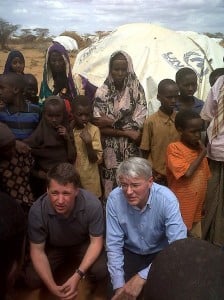 Over the weekend, Médecins Sans Frontières president Dr. Unni Karunakara created a stir by chastising charities for creating an unrealistic expectation of what humanitarian aid was capable of achieving in Somalia. According to Karunakara:
Over the weekend, Médecins Sans Frontières president Dr. Unni Karunakara created a stir by chastising charities for creating an unrealistic expectation of what humanitarian aid was capable of achieving in Somalia. According to Karunakara:
There is a con, there is an unrealistic expectation being peddled that you give your £50 and suddenly those people are going to have food to eat. Well, no. We need that £50, yes; we will spend it with integrity. But people need to understand the reality of the challenges in delivering that aid. We don’t have the right to hide it from people; we have a responsibility to engage the public with the truth.
Ian Bray, an spokesman for Oxfam quickly fired back:
“We’re being honest with donors and we have always been honest. A drought is a natural occurrence; a famine is man-made. We don’t go around to people saying we have a magic wand, give us £5 and we will make Africa feed itself. We do say give us £5 and we won’t use it to give you a history of Somalia, but we will use our expertise to save lives. This is what the bargain is we make with our donors. If you support us, we will do our level best to alleviate the distress for those people in most dire need.”
Both men make legitimate points, but I hope Karunakara’s comments won’t deter anyone from donating to disaster relief efforts in the Horn of Africa — which was, of course, not his intention. The UN estimates that the lives of up to 750,000 people will be at risk over the next four months and almost $1 billion in additional funding is needed to adequately respond to the crisis. Even if donors deliver the full amount, there will be limits to what NGOs and aid agencies can achieve — particularly in Somalia. However, it is clear that there is still a serious shortfall in emergency response funding, let alone the additional cash that will be required in order to support agricultural development and help stave off a future catastrophe.
Still, Karunakara’s point — that charities and development agencies need to be more honest with the public about what humanitarian relief can achieve — could be extended even further. Many organizations need to be more honest with themselves about what is possible. In a recent Rolling Stone article, Janet Reitman recounted many of the failures that have plagued efforts to rebuild Haiti in the wake of last year’s devastating earthquake. The problems have been numerous and include the lack of clearly defined and coordinated objectives between aid agencies, NGOs, and local institutions; a host of unrealistic or misguided projects; wasteful spending; and a lack of coordination with the Haitian government (widely considered corrupt and ineffective) which has contributed to the erosion of the international community’s credibility in the eyes of local people and politicians. Some of these problems are surmountable, but others are not — the key is to determine what can realistically be achieved and then tailor the mission around that assessment. That has not been done in Haiti and a similar argument could be made about efforts in Afghanistan.
With all the good intentions and resources in the world, there are still limits to what international aid can achieve. To be clear — I’m not advocating that we do less international development work and I am not calling for an end to ambition in global philanthropy and development. On the contrary, at a time when economic uncertainty has put foreign aid budgets on the chopping block, it is more important than ever to stay engaged in an increasingly interdependent world. Hopefully Karunakara’s comments will lead to a constructive debate that will help ensure that our expectations are more realistic, so that our efforts may be more effective.